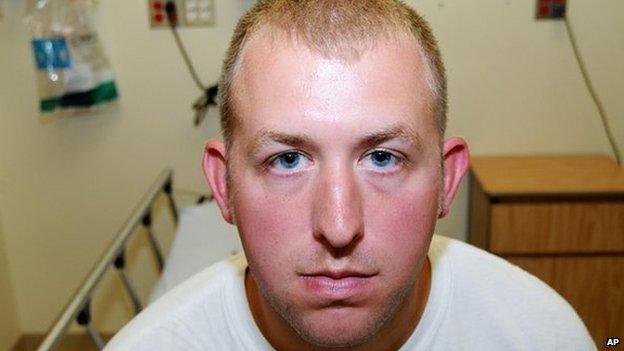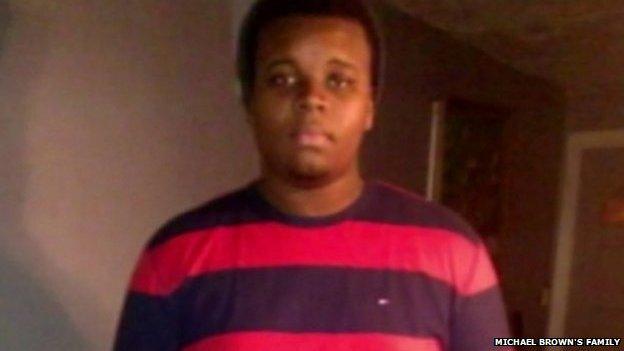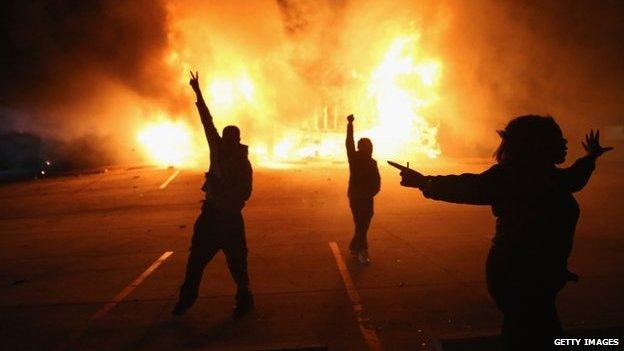Ferguson shooting: Darren Wilson quits police force
- Published

Darren Wilson insists he acted in accordance with the law
The white police officer who fatally shot unarmed black teenager Michael Brown in the US town of Ferguson has resigned.
Darren Wilson, who had been on administrative leave since the killing, told a newspaper he did not want to put the lives of police colleagues at risk.
Resigning was, he said, the "hardest thing" he had ever had to do.
Rioting rocked Ferguson and other towns this week after a jury decided he should not be charged over the killing.
BBC Washington correspondent Tom Esslemont says that to many in Ferguson, it was only a matter of time before Mr Wilson resigned.
His lawyer said his resignation was effective immediately.
The 9 August shooting in the St Louis suburb and the decision not to charge Mr Wilson triggered a nationwide debate over relations between black communities and law enforcement.
'Safety paramount'
The St Louis Post-Dispatch newspaper, external said Mr Wilson, 28, had decided to step down after his police department received threats of violence if he stayed on as an employee.

An undated family snapshot of Michael Brown

Demonstrators flooded on to the streets of Ferguson after the grand jury verdict, with several buildings set alight
The newspaper published what it said was his resignation letter, which read: "I have been told that my continued employment may put the residents and police officers of the City of Ferguson at risk, which is a circumstance that I cannot allow.
"For obvious reasons, I wanted to wait until the grand jury made their decision before I officially made my decision to resign.
"It was my hope to continue in police work, but the safety of other police officers and the community are of paramount importance to me. It is my hope that my resignation will allow the community to heal."
In a subsequent telephone interview on Saturday evening, the paper quoted Mr Wilson as saying: "I'm resigning of my own free will. I'm not willing to let someone else get hurt because of me."
Ferguson's Mayor James Knowles later said that Mr Wilson had resigned without receiving any severance payments.
At a news conference, the mayor also announced incentives to bring more African-Americans into the Ferguson police force, which is currently overwhelmingly white.
Family 'crushed'
Earlier this week, Mr Wilson told US media that before the shooting, Mr Brown had pushed him into his police car, hit him and grabbed at his drawn gun, and he said that he felt "like a five-year-old holding on to [US wrestler] Hulk Hogan".
The policeman said he had feared for his life.
Officer Darren Wilson, who shot and killed Michael Brown: "I know I did my job right"
Mr Brown's supporters said the teenager was attempting to surrender when he was shot. Some witnesses said the 18-year-old, who was unarmed, had his hands up.
Many in the African-American community had called for Mr Wilson to be charged with murder, but after three months of deliberation a Missouri grand jury - of nine white and three black members - made no recommendation of charges.
The family of Mr Brown have said they felt "crushed" by the decision.
The state prosecutor said physical evidence had contradicted some of the witness statements.
The decision means Mr Wilson will not face state criminal charges over the shooting. However, the US justice department has launched a federal investigation into whether Mr Wilson violated Mr Brown's civil rights.

The scene of the shooting
